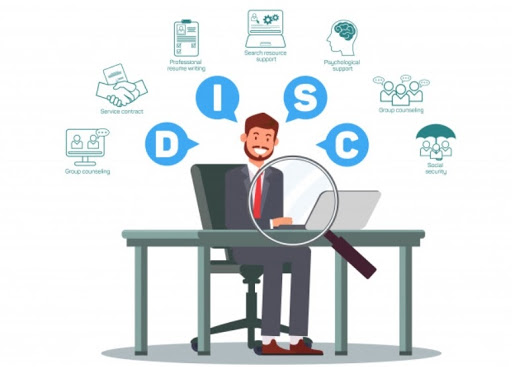
What is the DISC test for? The DISC model personality types
The DISC personality test reveals a lot about the temperament of the person taking it. It can tell you whether the person is introverted or extroverted, relationship-oriented or task-oriented. It is no wonder that large companies prefer to use it.
What is the origin and meaning of the name DISC personality test?
The DISC test was created by the American psychologist Dr William Moulton Marston. The DISC personality test (or DISC model) is an acronym made up of the first initials of the following four terms:
- Dominance - dominance (red),
- Influence - influence (yellow),
- Steadiness - perseverance (green)
- Compilance - compliance (blue).
The name comes from the fact that people are classified into the four categories above based on their answers to the DISC test questions. (Since the DISC test also distinguishes personality profiles by colour, these are also shown in brackets.)
Interestingly, Dr. W. M. Martson invented the prototype of the lie detector machine in addition to the DISC test created in the late 1920s. In fact, he was the inspiration for the Wonder Woman comic strip.
How to complete the DISC test

As it consists of simple, easy-to-answer questions, the DISC test can be seen as a questionnaire. Most often, you have to tick the most characteristic of you from a list of a few personality traits. Sometimes these traits are listed in pairs, and you have to choose from them within a question.
So, for example, you have to choose the one that is most characteristic of you:
- disgruntled,
- stubborn,
- interjection,
- overbearing.
But there are also personality trait pairs to choose from:
- calm and balanced,
- firm and dominant,
- accurate, precise
- cheerful, sociable.
The scope of the tests may vary. Once we have selected the one that we feel most true for each of the qualities offered, we then proceed to the assessment.
Assessment of the DISC test: the DISC personality types
Although the DISC model does of course exist on paper, it is now typically found on the internet in the form of an online DISC test. The assessment reveals which personality type you belong to. The DISC personality profile is in fact a personalised characterisation based on your answers to the questions.
The four personality profiles of the test are essentially constructed according to a psychological coordinate system. One axis of this imaginary coordinate system is formed by the introvert-extrovert line and the other axis by the task-oriented-attitudinal line. (Some sources refer to the DISC test as the temperament test and the individual profiles as the temperament type.) Like the test, the scope of the assessment, i.e. the DISC profile, can vary.
Now let's look in a little more detail at what the DISC personality types, based on the above criteria, actually represent.
Dominant (choleric)

They are task-oriented and extroverted, typically leaders, for example.
Key features of the dominant DISC personality profile:
- Definitive
- copes well with stress
- decide quickly
- is willing and able to take risks
- success focus
- temperamental
- competitive rather than cooperative
- willful, stubborn
Influencer (sanguine)
Relationally oriented and extroverted DISC personality profile. Salespeople and marketers usually fall into this group
The main characteristics of an influencing DISC personality are:
- creative
- expressive
- optimistic
- fun
- direct
- convincing
- Inspiring
- Charming
- Superficial
- scattered
- taxis
Persistent, stable (phlegmatic)

Relationship-oriented and introverted personality - this is a typical category for HR professionals, but can also include people in the helping professions.
Key characteristics of a stable personality type:
- empathic
- patient
- calm
- balanced
- cooperative
- honest
- slow
- have difficulty expressing their emotions
- avoids conflicts
Rule follower (melancholic)
Task-oriented and introverted DISC personality. Typical of people in jobs requiring analytical thinking, e.g. engineers, analysts, controllers.
Essential characteristics of the DISC rule-following personality type:
- Objective
- focus on the facts
- impartial
- understand the context, the background
- accurate, precise
- meets deadlines
- Trusted
- lost in the details
- maximalist
- tend to ignore emotions and the emotional consequences of their actions and communications
The role of the DISC model in human resources and project management

The DISC test is also used as a preliminary personality test for potential employees. It can also help managers to get an idea of personal qualities in candidates that may not be revealed during the interview.
In the DISC test, there is no right or wrong answer, no wrong or right rating. At the same time, the test taker can gain a better understanding of his or her own strengths and areas where he or she can improve his or her personality.
Some areas where the DISC test can be useful are:
- better understanding of others and ourselves,
- increase the efficiency of the selection of professionals,
- developing internal and external communication, creating personalised communication strategies,
- increase the effectiveness of teamwork.
It is important to add that the DISC test is never a test of the quality of the work done, but only of the personality of the person who completes it - without any kind of qualification.
Have a question? Contact us!
Do you want to explore what leadership skills are your strengths and where you could develop as a leader? Do you have other questions about project management? Contact us for a free consultation!

 Designabc
Designabc